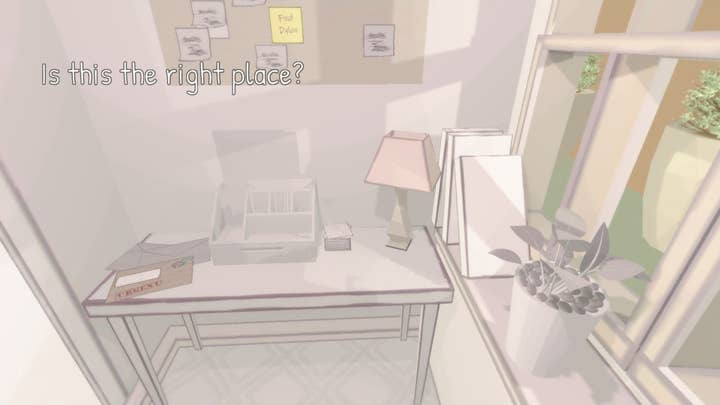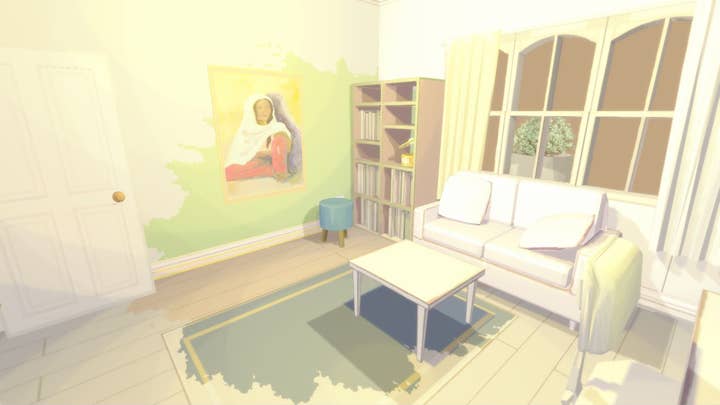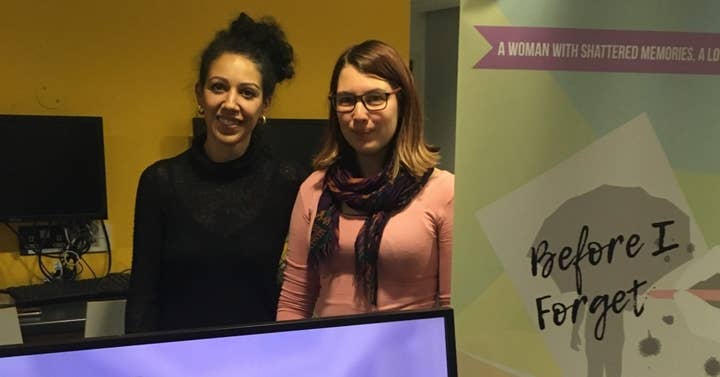Defying game design rules to simulate dementia in Before I Forget
3-Fold Games' Chella Ramanan and Claire Morwood on the difficulty of developing a short game and the invaluable support from Humble and Gaming The Mind
Sunita needs to go to the toilet but can't remember where the bathroom is. Players must guide her but every time they open a door, they are instantly sent back to the beginning.
This is a key scene in Before I Forget, the debut game from micro studio 3-Fold Games. Released earlier this month, it gives players an insight into what it's like living with dementia. The search for the bathroom, for example, is designed to express the "sense of losing time and the confusion" that many sufferers have to cope with.
It was a central part of the demo co-founders Chella Ramanan and Claire Morwood would show at events and consumer games shows, but players would often approach them afterwards with a frown on their face.
"They'd say, 'Yeah, I really like it but is there a way of getting to the toilet on time?'," says Ramanan. "You could see them grappling with that concept, of not being able to win at dementia.
"Confusing or frustrating the player is usually a game design no-no -- but when you're trying to represent dementia, that's a key aspect of the experience. Why don't I know who that is, or who I am? That growing sense of anxiety this causes. Sunita, being an unreliable narrator, doesn't even know she's confused sometimes. Gamers are used to the power fantasy -- they're in control, they're competent and that competency increases as the game goes on. We're playing against that."
The project originated as an entry to the 2016 XX+ Game Jam, where Ramanan and Morwood met for the first time. The theme was borders, and when the duo began thinking "less about physical borders and more about mental health," Ramanan suggested a game about dementia. The concept was based on a story idea she had been playing with.

"I have this Christopher Nolan-esque preoccupation with memory, what it is and what it means when you lose it," she explains. "It's something I've always been interested in as a writer. I had never written it because it was meant to be a game, not a short story or something else."
She adds that games as a medium can convey the experience of dementia in a way that films, TV and books cannot, even if that can be at odds with what players expect.
"There's definitely a difference between watching a film or reading a book and actually walking around the house as Sunita and experiencing that confusion first hand, not knowing if it's you that's done something wrong because you're in control -- it's called a controller, after all," she says. "So it's definitely something games can do, create a more visceral reaction to things, to a story and just take you away to that place in a different way.
Before I Forget won the game jam's Audience Choice Award as the title attendees most wanted to see finished, which encouraged Ramanan and Morwood to continue working on the game. Ramanan served as narrative designer, while Morwood was the project's programmer and artist.
They dove into research, something the time constraints of a game jam rarely allows, and continued gathering feedback on the demo from local events.
"We were really surprised by the warmth of reception we got," says Ramanan. "Then this woman who worked in the care sector, specialising in Alzheimer's, came up and said, 'Oh, you couldn't have a rug like that in a house with someone with dementia' and she gave us lots of pointers. That made us read a lot more around it -- some of the symptoms are more unusual than we thought."
"I have this Christopher Nolan-esque preoccupation with memory, what it is and what it means when you lose it"
Chella Ramanan, 3-Fold Games
This became even clearer as 3-Fold began regularly working with Gaming The Mind, an organisation focused on mental health in the games industry. The organisation's experts helped the pair gather feedback that better explained the complexities of dementia and refined the game's narrative.
"One of the things in particular they suggested was that we changed some of the wording in the way that Sunita describes objects," says Morwood. "In an early version of the game, there was a key Sunita could find, described as a 'shiny metal object.' Gaming The Mind said people who suffer dementia often describe function over form. So instead of describing what it looks like, it might be more realistic if she called it a 'turning object.' We used that feedback with lots of other thoughts Sunita has in the game."
Ramanan adds: "That was really useful, [learning] the way the cognitive functions change. It made us ask questions like, 'Would Sunita even be able to write these notes?' and they were able to reassure us because there's a spectrum of symptoms. Dementia doesn't affect everyone in the same way. So she might be able to quite easily write something, but then have trouble reading it back."
Using this knowledge, the 3-Fold duo explored other ways to use the unique characteristics of games, as well as audio and visual cues, to better express the experience of living with dementia. For example, the connection between music and memory became a big part of certain scenes.

"You'll sometimes find when people with dementia listen to music that was important to them when they were much younger, they'll suddenly have a lot of lucidity and clarity around that," says Morwood. "They'll be able to tell you all about these memories, even if a few minutes ago there were struggling to recall anything.
"That was really important in leading the design around the game. Most of the game is very quiet, with ambient house sounds, and then there are key moments when you hear music. Sometimes, the colour spreads in time with the music as well, which represents the clarity she's having."

While the game was increasingly well received, it elicited an interesting reaction from some people. Ramanan took the script to the writing group she attends, for example, who asked whether the game was for teachers or hospitals. There was an assumption that a game tackling a serious subject, must have a purpose beyond entertainment -- even among the group members who played games.
"We got that a lot with investors as well," says Ramanan. "Things like, 'This would be great in the healthcare sector' -- which they'd probably never say about Elizabeth Is Missing, a murder mystery film where the protagonist has dementia. There's something about the interactivity of games that makes them feel like a tool to some people, which I find really puzzling.
"I was really nonplussed at my writing group for saying that. It's a game, it's for anyone who wants to have this experience. It's for its own sake."
Another aspect of Before I Forget that raised investors' eyebrows was the length, which clocks in at just one hour. Despite how impressed investors were with the game, such a short experience was a problem because they wanted to sell it at a higher price point.
"We came away thinking we needed to make it longer," says Ramanan. "Just because it's a short story doesn't make it any less pertinent or impactful or emotional. Why do games have to be big and long? Not all books have to be. It's the length it needed to be.
"[Humble] took a lot of the stress away because we'd been putting a lot of our own personal funds into it"
Claire Morwood, 3-Fold Games
"We tried extending it for a very short time, but it didn't feel like the game we wanted to make anymore. It distracted from the core theme."
Morwood notes that the length was also a product of their resources. The project was unfunded for most of its development, and both she and Ramanan were working on it part-time. Ramanan is currently a narrative designer at The Division developer Massive Entertainment, while Morwood was a full-time programmer for much of Before I Forget's development.
Balancing their full-time jobs with this project became difficult, and neither recommends that other developers try it, but the encouraging feedback from players at each event spurred them on. They both later admitted to each other they began to have doubts about the game and were struggling to maintain the balance, but hadn't wanted to worry the other.
"It was difficult because we were working remotely from each other," Morwood says. "Maybe if we'd been in the same office, we could have had those conversations. It was tough to read each other online."
Ramanan adds that, thanks to Morwood only living a one-hour drive away, weekends working at her house would also help: "We'd get so much more done in two days than we would in two or three weeks. It was incredible how productive, creative and inspiring those short weekends together were."

The project was given a real shot in the arm when Humble reached out to 3-Fold in the hopes of publishing it as a Humble Original. As part of the partnership, Ramanan and Morwood received finishing funds that not only helped them polish and refine the game, but also add voice acting and work with PR and marketing agency Nerd Pirates on promoting the game.
"It was a game-changer," says Ramanan. "It's amazing how big a difference just a little amount of funding can make to a small team making a small game like ours."
Morwood adds: "It took a lot of the stress away because we'd been putting a lot of our own personal funds into it so it was nice to know that we didn't have to do that any more."
Before I Forget was published and included in the Humble Choice bundle in June, arriving on Steam and Itch.io for on July 16. The game has since received plenty of praise from players and influencers alike, and 3-Fold hopes to bring it to more platforms in future.
In the meantime, a second partnership has been secured -- this time with Alzheimer's Research UK. Impressed by the game, the charity reached out to the developers to discuss how it might be used in line with its efforts during World Alzheimer's Month this September. 3-Fold is also planning to donate some of its profits from that month to the charity.
For Ramanan and Morwood, the partnership is a testament to the effort the duo has put into the project ever since that game jam four years ago.
"It's a great endorsement for us and all the support we've had from Gaming The Mind," says Ramanan.
Morwood concludes: "[Alzheimer's Research UK has] been so good and supportive the whole time we've been talking to them. It's a good thing to do, and it's also really validating to know that we've made something that's a sensitive portrayal of dementia."










